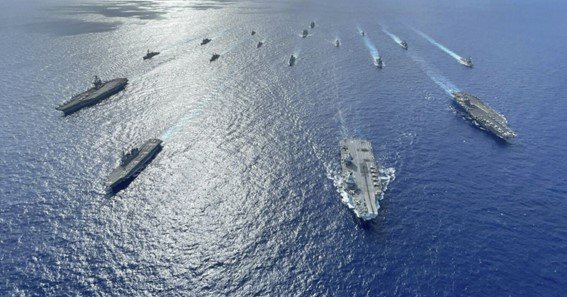Are you curious to know what is blue water policy? You have come to the right place as I am going to tell you everything about blue water policy in a very simple explanation. Without further discussion let’s begin to know what is blue water policy?
In the vast expanse of international waters, countries around the world have adopted various maritime policies to safeguard their interests and maintain a significant presence in global affairs. One such policy is the Blue Water Policy, which defines a nation’s approach to naval capabilities, maritime security, and oceanic influence. In this blog, we will delve into the concept of the Blue Water Policy, its objectives, and its significance in shaping a country’s maritime strategy.
What Is Blue Water Policy?
The Blue Water Policy refers to a nation’s decision to develop and maintain a naval fleet capable of operating across oceans, far from its own shores. The term “blue water” signifies the vastness of the open seas, as opposed to “brown water,” which represents coastal or inland waters.
Objectives Of The Blue Water Policy
- Global Presence: The Blue Water Policy enables a nation to project its influence and demonstrate its presence across international waters. It allows a country to assert itself on the global stage and participate in international affairs.
- Maritime Security: By maintaining a strong naval presence in the high seas, a country can protect its trade routes, merchant vessels, and strategic interests from potential threats such as piracy, terrorism, and other forms of maritime crime.
- National Defense: The policy enhances a nation’s defense capabilities by extending its naval reach and deterrence capacity against potential adversaries.
- Supporting Diplomacy: A robust naval fleet can be utilized to support diplomatic efforts, engage in humanitarian missions, and provide assistance during natural disasters or other crises in distant regions.
Significance In Geostrategic Planning
The Blue Water Policy plays a vital role in shaping a country’s geostrategic planning and regional influence:
- Power Projection: Nations with blue water capabilities can assert themselves in regions beyond their immediate borders, allowing them to influence regional dynamics and strategic balance.
- Resource Security: The policy is crucial for resource-rich countries to protect their offshore resources, such as oil and gas reserves, and ensure their exploitation for national benefit.
- Naval Diplomacy: Through naval exchanges, joint exercises, and port visits, countries can foster diplomatic ties and promote cooperation with other nations.
- Supporting Alliances: Blue water capabilities are often critical for countries participating in military alliances, as they can contribute to joint operations and global security.
Challenges And Costs
While the Blue Water Policy offers numerous advantages, it also comes with challenges and costs:
- Resource Allocation: Maintaining a modern, capable naval fleet requires significant financial investments and allocation of resources, which may impact other areas of national development.
- Technological Advancements: Keeping pace with rapidly evolving naval technologies and modernization can be demanding and resource-intensive.
- International Tensions: A strong naval presence can lead to tensions with other maritime powers, potentially escalating disputes over territorial waters or exclusive economic zones.
Conclusion
The Blue Water Policy is a strategic choice that allows nations to expand their maritime reach, ensure security, and exert influence on the global stage. By projecting power and protecting their interests in international waters, countries can navigate the seas with purpose and purposefully engage in diplomatic efforts, peacekeeping missions, and crisis response. While the Blue Water Policy requires substantial investments and comes with certain challenges, its potential benefits in terms of national security, resource protection, and global influence make it a crucial aspect of a country’s comprehensive maritime strategy.
On GetDailyBuzz you will get to know beneficial information which required in your daily life.
FAQ
What Is Another Name For The Blue Water Policy?
Franciso de Almeida introduced the Blue water policy (Cartaze System). “Blue Water” policy was to be powerful at the sea instead of building forts on Indian land.
Which Company Adopted The Blue Water Policy In India?
Notes: Portuguese trading company adopted the ‘Blue Water Policy’ in India. Francisco de Almeida who became the 1st Portuguese viceroy in India initiated the Blue Water Policy.
What Was The Blue Water Policy In Albuquerque?
The Blue Water Policy was the fortification of Indian Ocean, not for the security but for the establishment of Portuguese business in the Indian Ocean. The Blue water policy was reversed by Alfonso de Albuquerque.
Who Introduced Policy Of Imperialism In India?
The policy of imperialism is introduced by Portuguese Governor Afonso de Albuquerque. Portuguese Governor Afonso de Albuquerque is considered the real founder of Portuguese power.
I Have Covered All The Following Queries And Topics In The Above Article
What Is The Blue Water Policy
What Is Blue Water Policy Upsc
What Is Blue Water Policy In Hindi
What Is Blue Water Policy In Kannada
What Is Policy Of Blue Water
What Is Blue Water Policy Of Portuguese
What Is Blue Water Policy Class 10
What Is The Policy Of Blue Water
What Is Meant By Blue Water Policy
What Is The Meaning Of Blue Water Policy
What Is Mean By Blue Water Policy
What Is Blue Water Policy Who Introduced It
What Is Blue Water Policy?
Why Was Blue Water Policy Introduced
Blue Water Policy In Which Year
Blue Water Policy Also Known As
Blue Water Policy Wikipedia
Blue Water Policy Means
Blue Water Policy (Cartaze System)
Blue Water Policy In India
Blue Water Policy In Tamil
What Is Blue Water Policy
What is blue water policy?

